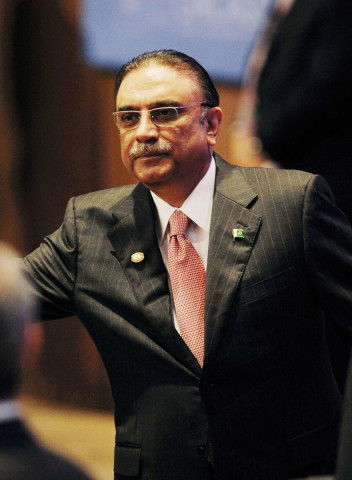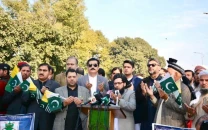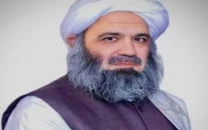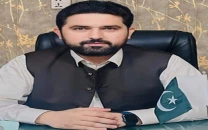Constitution embargoes President's political activity: legislators, experts
Speakers at discussion criticise Zardari's use of Presidency for party meetings, finalisation of electoral rolls.

Constitution embargoes President's political activity: legislators, experts
Among the plethora of charges on Zardari in wake of the national reconciliation ordinance decision by the Supreme Court, his use of the Aiwan-e-Sadr to host meetings of senior party leadership – most of whom were also coincidentally members of the National Assembly and or the Senate.
That last point was highlighted by the President at a party meeting in Karachi last month where he quipped that the National Assembly was his 'constituency' and it was perfectly legal to hold meetings with members of his constituency in the Presidency.
The speech, it seems, has done little to faze some Senators, MNAs and experts. “The Constitution of the country clearly embargoes any political involvement by the President,” said Anusha Rehman, Member National Assembly (MNA) while commenting on the President’s non-partisan character enshrined in the Constitution following a minor debate triggered during a discussion on ‘The Unfinished Agenda of Electoral Reforms in Pakistan’, organised by the Pakistan Institute of Legislative Development and Transparency (Pildat).
Former Information Minister Javed Jabbar supported her point of view asking for the the President to dispose of political involvement, maintaining that coming from a political party was not a problem. “Unless you (the President) dissociate yourself from the activities of the party, you would remain a partisan President thus violating the sanctity of this office,” Jabbar observed. He was however, quickly confronted by Arif Nizami, the editor of English language daily Pakistan Today who said being either partisan or non-partisan does not matter.
“Did we ever have a non-partisan president in this country?” asked the veteran journalist.
“Yes,” was the prompt reply.
“President Ayub, President Yahya Khan…” answered former minister of interior Lt. Gen (R) Moinuddin Haider who provoked laughter from the audience that lasted for a good minute and half.
Despite a lone voice disagreeing, the consensus among the discussants remained firm on having non-partisan nature of the office of the President.
“In the presence of a partisan President and governors of provinces, no election would be free and fair,” ventured Ahmed Bilal Mehmoob, the Director of Pildat.
Asked why the main opposition political party was not exerting pressure on the President, Pakistan Muslim League-Nawaz (PML-N) MNA Rehman too backed down, saying she was speaking in her individual capacity and could not comment on what the party policy was in this regard since she was not a party correspondent. She, however, reiterated her earlier stance about the Constitutional embargo.
Electoral lists criticised
Most legislators participating in the discussion were women belonging to the opposition PML-N who asked critical questions of the Election Commission of Pakistan (ECP). However, no ECP representative was present at the discussion to answer them.
MNA Rehman questioned the authenticity of the final electoral rolls prepared by National Database and Registration Authority (NADRA) as they were, she claimed, based on the census list of housings prepared in early 2011, which had become redundant after six months.
“We also wished these rolls were made on the old census but the final decision was to be taken by the election commission. Now we have crossed the bridge and the rolls have been finalised,” said Tariq Malik, the Chairman NADRA while responding to her.
He added that among the 84.6 million registered voters, almost half comprised of youth below the age of 35 years. Malik, though claimed NADRA’s work had borne fruit since these electoral rolls improved voter turn out in the recent by-elections of NA-151 Multan (40 per cent turnout), adding that the authority’s target is ‘to achieve 65 percent turn out for general elections.’
MNA Nasir Shah from Balochistan, Shahid Javed Burki, a law expert and many others demanded an increase in the number of polling stations and rationalising constituencies in order to facilitate voter turn out.
Pildat’s director Mehboob told the particiapants that ECP only achieved 40 per cent of its goals set for 30 June 2012. Since March this year, he said only one per cent of work was done towards that end, he lamented.
Published in The Express Tribune, August 2nd, 2012.



















COMMENTS
Comments are moderated and generally will be posted if they are on-topic and not abusive.
For more information, please see our Comments FAQ